Please follow us on Twitter for regular updates @MusicStrathaven
Music Department Teachers
Mr R Herbertson, Ms N Robson, Miss H Devine
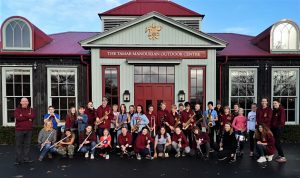
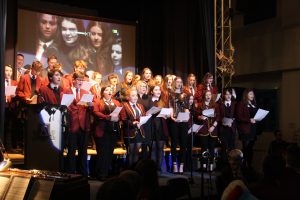
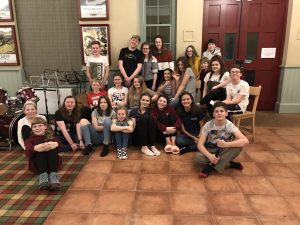
‘Music is to the soul what words are to the mind’
Edward Bulwer-Lytton
Course Information
S1-3 BGE, National 5, Higher, Advanced Higher, Skills for Life, Extracurricular.
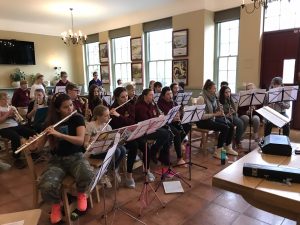
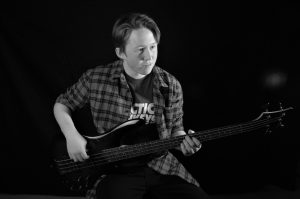
Music Instructors
Monday
Mr Longalong Woodwind, Mr Reilly Guitar + Bass Guitar, Mr Bradley Brass
Tuesday
Mr Bryans Drumkit + Tuned Percussion
Wednesday
Mr Dowling Strings, Mrs Cyran Cello
Thursday
Mr Longalong Woodwind, Mr Reilly Guitar + Bass Guitar
South Lanarkshire Instrumental Music Service
Elaine Duffy, Paul Michael
Instrument tuition is offered to pupils from P4 onwards, depending on the instrument, the pupil’s ability (as determined by the instructor) and the number of places available.
Tuition is provided via schools, by visiting instructors, as part of the Instrumental Music Service (IMS).
If your child has been selected for tuition, please note the following:
- pupils in P5 will get one year of free tuition, thereafter charges will apply as detailed below
- students undertaking any SQA Music award (S3-S6) within school are exempt from paying the annual contribution
- pupils will get a minimum of 30 lessons per school year, delivered over three blocks
- pupils will be encouraged to participate in school ensembles, bands and performances. When pupils reach an appropriate standard, they may also be invited to join a South Lanarkshire orchestra, band or ensemble
Courses
S1-3 BGE
Throughout S1-3, pupils will have the opportunity to develop skills on a wide range of instruments including keyboard, guitar, drum kit, voice and many more. Pupils will also have the opportunity to play as a soloist and as part of a group.
S1- Pupils will get to try each of the classroom instruments.
S2- Pupils will choose two instruments on which to focus.
S3- Pupils will choose two instruments on which to focus. If pupils choose Music in 3rd year, they will carry on with the same instruments from 2nd year.
Pupils will also develop their knowledge of:
- Music theory, which is essential for both reading and writing music.
- Styles, genres and instruments.
- Key music terminology to help them comment on features in music.
- Compositional techniques.
National 5
The purpose of the National 5 Music course is to provide candidates with a broad practical experience of performing, creating and understanding music. The course enables candidates to work independently or in collaboration with others, and can help them to plan and organise, to make decisions and to take responsibility for their own learning. The course aims to enable candidates to broaden their knowledge and understanding of music and musical literacy by listening to music and identifying level-specific music concepts, signs and symbols, create original music using compositional methods, and perform music.
The National 5 course has four components.
1: Question Paper – (35%)
2: Assignment- (15%)
3: Performance on instrument 1 – (25%)
4: Performance on instrument 2 – (25%)
Question Paper
The purpose of the question paper is to assess candidates’ knowledge and understanding of musical concepts and musical literacy. Candidates demonstrate their conceptual knowledge and understanding of music by responding to questions that relate to excerpts of music in different styles. A range of question types is used in the question paper. All questions in the question paper are mandatory.
The question paper gives candidates an opportunity to demonstrate the following skills, knowledge and understanding:
- aural perception and discrimination
- knowledge and understanding of a range of musical styles, concepts and musical literacy
- The question paper has 40 marks (35% of the overall course award).
Assignment
The purpose of the composing assignment is to explore and develop musical ideas to create music. The assignment has two parts:
- composing one piece of music
- reviewing the composing process
The composed piece may be in any style/genre and must last between a minimum of 1 minute and a maximum of 2 minutes and 30 seconds. The assignment has 30 marks (15% of the overall course award).
Marks are awarded for composing music (20 marks) and composing review (10 marks)
Performance
The purpose of the performance is to allow candidates to demonstrate skills on either two selected instruments, or on a selected instrument and voice. The performance can be solo and/or in a group setting. The overall programme must be a minimum of 8 minutes and must not exceed 8 minutes and 30 seconds. The performance time on either of the two selected instruments, or instrument and voice, must be a minimum of 2 minutes within the overall 8 minute programme.
Candidates should perform a minimum of two contrasting pieces of music on each of the two selected instruments, or instrument and voice. These should be of an appropriate standard/level of difficulty.
The performance has 60 marks (50% of the overall course award). Each programme is marked out of 30 and individual pieces of music given a mark out of 10.
Useful Resources
Useful websites for Music Revision
https://www.bbc.co.uk/bitesize/subjects/zkty4wx
Higher
The course has an integrated approach to learning and combines practical learning and understanding of music. Candidates draw upon their understanding of musical styles and concepts when performing and creating music. Candidates experiment with and use musical concepts in creative ways, within a range of compositional methods, as they compose original music and reflect on their creative choices. Through listening, they develop knowledge and understanding of a variety of musical styles, level-specific concepts, and signs and symbols used in musical notation. Candidates develop their performing skills on two selected instruments, or on one selected instrument and voice, through regular practice and self-reflection.
The Higher course has four components:
1: Question Paper – (35%)
2: Assignment – (15%)
3: Performance on instrument 1 – (25%)
4: Performance on instrument 2 – (25%)
Question Paper
The question paper assesses candidates’ knowledge and understanding of musical concepts and musical literacy. Candidates demonstrate their conceptual knowledge and understanding of music by responding to questions that relate to excerpts of music in different styles. A range of question types is used in the question paper. Candidates must answer all the questions.
The question paper gives candidates an opportunity to demonstrate the following skills, knowledge and understanding:
- aural perception and discrimination
- knowledge and understanding of musical literacy and a range of musical styles and concepts
The question paper has 40 marks out of a total of 130 marks. This is scaled by SQA to represent 35% of the overall marks for the course assessment.
Assignment
The assignment allows candidates to explore and develop musical ideas to create music.
It has two parts: composing one piece of music and reviewing the composing process
The composed piece may be in any style or genre and must last a minimum of 1 minute and a maximum of 3 minutes and 30 seconds.
The assignment has 30 marks out of a total of 130 marks. This is scaled by SQA to represent 15% of the overall marks for the course assessment.
Marks are awarded for composing music (20 marks) and composing review (10 marks).
Performance
The performance allows candidates to demonstrate skills on either two selected instruments, or on a selected instrument and voice.
The performance can be solo and/or in a group setting. The overall performance programme must be a minimum of 12 minutes and must not exceed 13 minutes. The performance time on either of the two selected instruments, or instrument and voice, must be a minimum of 4 minutes within the overall 12-minute programme.
Candidates must perform a minimum of two contrasting pieces of music on each of the two selected instruments, or instrument and voice. These should be of an appropriate level of difficulty.
The performance has 60 marks out of a total of 130 marks. This is scaled by SQA to represent 50% of the overall marks for the course assessment. Each instrument or voice is marked out of 30, and individual pieces of music are given a mark out of 10.
Useful Resources
https://www.bbc.co.uk/bitesize/subjects/z8hv9j6
Advanced Higher
The course enables learners to develop skills in performing, creating, understanding and analysing music. It enables learners to develop and extend their applied musical skills in challenging contexts and to develop greater depth of understanding of music through listening. It provides learners with the skills they need to perform challenging music with musical and technical accuracy and fluency, while realising the composers’ intentions. It also provides learners with opportunities to develop composing skills in sophisticated and creative ways. Furthermore, the course also helps learners develop advanced aural skills and demonstrate their understanding and analysis of music through researching and analysing complete movements or works.
The course assessment has five components: three mandatory components and two optional components.
1: Question Paper – (35%)
2: Assignment- (15%)
3: Performance on instrument 1 – (25%)
4: Performance on instrument 2 – (25%)
Or
Portfolio – (25%)
Question Paper
The question paper assesses candidates’ knowledge and understanding of musical concepts and musical literacy.
Candidates demonstrate their conceptual knowledge and understanding of music by responding to questions that relate to excerpts of music in different styles. A range of question types is used in the question paper. Candidates answer all the questions.
The question paper gives candidates an opportunity to demonstrate the following skills, knowledge and understanding:
- aural perception, discrimination and analytical thinking
- knowledge and understanding of a range of musical styles, concepts and musical literacy
The question paper has 40 marks out of a total of 120 marks. This is scaled by SQA to represent 35% of the overall marks for the course assessment.
Assignment
The assignment allows candidates to explore and develop musical ideas to create music. It has three parts:
- composing or arranging one piece of music
- reviewing the creative process of their composition or arrangement
- analysing a chosen piece of music
The assignment has 20 marks out of a total of 120 marks. This is scaled by SQA to represent 15% of the overall marks for the course assessment.
Marks are awarded for: composing or arranging music (10 marks), review of the creative process (5 marks), analysis (5 marks)
Performance
The performance on instrument 1 is a mandatory course assessment component. The performance on instrument 2 is an optional course assessment component. Pupils either complete this or a portfolio.
For candidates performing on instrument 1 and instrument 2, the total performance time for both instruments must be a minimum of 18 minutes and must not exceed 20 minutes. Candidates do not need to perform for an equal length of time on each of their instruments, or on their instrument and voice. The performance time on either of the two selected instruments must be a minimum of 6 minutes within the overall programme. The programme of music must include a minimum of two contrasting pieces of music.
Useful Resources
Skills for life
Extracurricular
Monday Flute Group- (1.45pm) Soul Band-(1.40pm)
Tuesday Junior Choir- (1.45pm)
Wednesday Ceilidh Band- (12.35pm), Senior Choir- (12.50pm), String Orchestra- (12.50pm)
Thursday Ukulele Group- (12.50pm), Guitar Group- (12.50pm), Concert Band- (3.05pm)
‘One good thing about music, when it hits you, you feel no pain’ Bob Marley